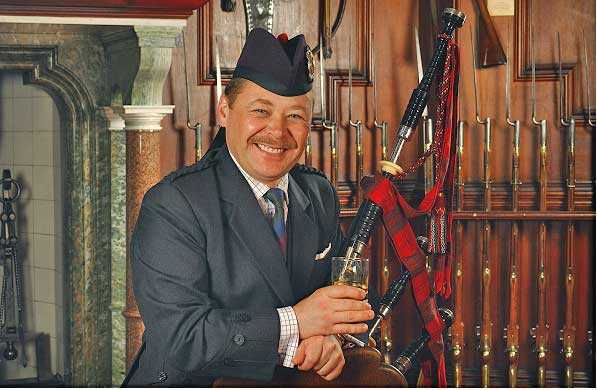Gordon Walker
-Pipe Major- (1967- )
 Gordon Walker was born in Ayrshire on December 13, 1967. He started piping at the age of four and a half with the late Pipe Major David Kay from Cumnock in Ayrshire, whom he called “a brilliant tutor.” He stayed with David until the age of sixteen.
Gordon Walker was born in Ayrshire on December 13, 1967. He started piping at the age of four and a half with the late Pipe Major David Kay from Cumnock in Ayrshire, whom he called “a brilliant tutor.” He stayed with David until the age of sixteen.
With two uncles who were pipers in the Scots Guards, it was no surprise when he enlisted as a boy soldier in The Royal Highland Fusiliers (Princes Margaret’s own Glasgow and Ayrshire Regiment). He was sent for training to Bridge of Don Aberdeen, where he came under the guidance of the great player Pipe Major Iain M. Morrison (Queen’s Own Highlanders). Gordon had two years of instruction with Iain before he joined the battalion in West Berlin.
Steady progress through the ranks followed when Gordon was invited to take the Pipe Major’s certificate at Edinburgh Castle and passed with Distinguished honours. He subsequently saw active service in the Gulf war in 1991 and tours of duty in Bosnia in 1995 and Northern Ireland in 1996 . Later in his army career he had Piobaireachd tuition from the late Captain Andrew Pitkeathly (Argyll and Sutherland Highlanders), former personal piper to HM Queen Elizabeth II and Director of Army Bagpipe Music.
During this time Gordon’s competitive career soared. He won the Gold Medal at Oban in 1993, and at Inverness the following year. He won the Open Piobaireachd at Oban in 1995 and 2007. But it was his prowess as a light music player that attracted the most attention. He won the Former Winners March, Strathspey and Reel at Oban in 1994, 1995, 1996, 2003, 2004 and 2005, and at Inverness in 1990, 1993, 2000, 2001. He won the Glenfiddich Championship in 2007. At the time of this writing his competitive career is still in full flight.
Gordon left the Army in 1999 and joined the staff of The College of Piping as the senior instructor. Shortly afterwards he transferred to the National Piping Centre, where he spent five years as senior instructor there. In January of 2005 he left the Centre to take up the post as Piping instructor with St. Columba’s school’s piping program in Renfrewshire.
Earlier, around the end of 2002, Gordon had been approached by the Commanding Officer of the 52nd Lowland Regiment Territorial Army to come back into uniform and rebuild the Regimental Pipes and Drums. He accepted and has since turned this band into one of the leading grade two bands in the world.
As a recitalist, Gordon is a piper’s piper and his performances can be breathtaking. His creative skill in arranging existing tunes is brilliant, and while he is not a prolific composer, his jig “The Fiddler’s Rally,” is certainly one of the great compositions of the last quarter century. Gordon describes the genesis of the tune:
‘The Fiddler’s Rally’ started really from when I heard my brother Colin play a similar two-parted piece on his accordion when he was a wee lad perhaps of six or seven. The tune was called ‘Donald Iain Rankin’ and it started in sort of reverse from the pipe tune, coming from the high A down the scale. Of course, I couldn’t accommodate the lower notes that fiddle and accordion use and so for the longest time I just sort of diddled around with the melody on the practice chanter. I also frequently heard the Scottish Fiddle Orchestra play ”Donald Iain Rankin” at fiddlers’ rallies at some of their gigs, so it stayed with me in that context.
Years later I was posted to Belfast as a sergeant with my Regiment, The Royal Highland Fusiliers, on a six-month tour, and whilst off duty one day I started playing the tune again on chanter, this time with manuscript in front of me. From the original “Donald Iain Rankin” two-parted tune, I finally arranged the melody to fit the pipe scale and then composed a further two parts to make it a four-parted jig. But I didn’t feel the four parts were enough in relation to the ending of each part, and so I carried on and came up with another two parts, making it a six-parted jig. I still wasn’t convinced this was the tune finished, and it wasn’t until the final eighth part was composed did I feel it all came together perfectly rather like the jig saw. The Hornpipe version only happend a couple of years ago and I’m delighted with both the jig and Hornpipe for their musicality and or course for the fun of playing them.
Gordon lives in a small village called Moscow, near Galston, in his native Ayrshire countryside.
JM, February 2008

2 Comments
The fiddlers rally has become my absolute favourite tune.
Hi Gordon
Just trying to track down the piper who was a friend of Adam McCracken.
I am his step son and wanted to talk to you as Adam has recently passed away
I am fairly sure this is you, we met at Lorraine’s Funeral last August 07824 164787